Opinion: Warning signs for Democrats
- Oops!Something went wrong.Please try again later.
- Oops!Something went wrong.Please try again later.
- Oops!Something went wrong.Please try again later.
- Oops!Something went wrong.Please try again later.
- Oops!Something went wrong.Please try again later.
- Oops!Something went wrong.Please try again later.
- Oops!Something went wrong.Please try again later.
- Oops!Something went wrong.Please try again later.
Former Sen. Eugene McCarthy, a professor-turned-politician from Minnesota, had a reputation for being “relaxed to the point of laziness and humorous to the point of cynicism,” as syndicated columnist Joseph Kraft wrote.
An example: McCarthy once joked that “being in politics is like being a football coach. You have to be smart enough to understand the game and dumb enough to think it’s important.”
So it was surprising to many when McCarthy shook up the political world by announcing on November 30, 1967 that he would enter the Democratic presidential primary in at least four states, challenging the president from his own party, Lyndon B. Johnson, mainly to protest the administration’s escalation of the Vietnam War.
McCarthy said he hoped his move would help cure “the growing sense of alienation from politics” and tamp down talk of third-party candidacies.
Still, the New York Times described McCarthy’s announcement as a “bantering, low-key news conference” and noted that it wasn’t apparent whether he really intended to secure the Democratic nomination for himself or potentially clear the way for fellow Democrat, Sen. Robert F. Kennedy, to take Johnson’s place at the top of the ticket.
But it soon became clear that McCarthy touched a nerve. Antiwar protesters went “clean for Gene,” cutting their hair and shaving their beards to canvass for the senator. Less than four months after his announcement, McCarthy nearly beat Johnson in the New Hampshire primary, prompting the president to drop out of the race. A deeply divided Democratic party went on to lose to Richard Nixon in November.
Today’s White House has to view the events of 1968 with some concern, particularly since Thursday’s CNN poll made clear the depths of President Joe Biden’s troubles. Even if, as seems likely, Biden avoids a major challenger among Democrats, he still faces the prospect of a close race against whoever wins the GOP nomination.
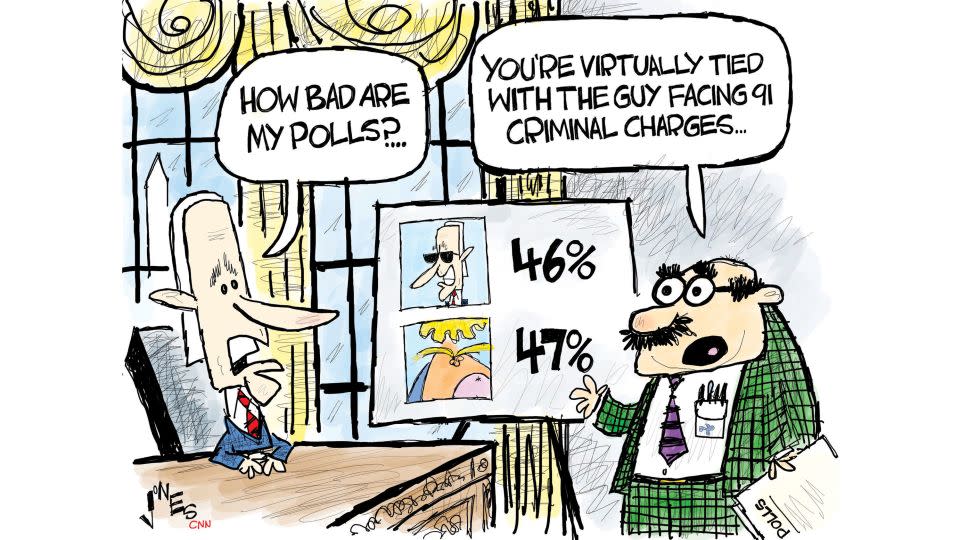
“Biden is even losing the enthusiasm of his own party, with an astounding 67% of Democratic voters saying that the party should nominate a different candidate,” wrote Julian Zelizer. “Only 28% of Americans say he inspires confidence (down 7% from March), and perhaps most concerning of all, 46% of all registered voters felt that any Republican nominee would be better than Biden in 2024.”
Yet so far, Biden has no strong rival within his party. Robert F. Kennedy Jr., the late senator’s son, is running against Biden in the primary, as is Marianne Williamson, but they aren’t considered formidable contenders.
In contrast to the 1968 election, today’s Democratic party isn’t split by a major issue like the Vietnam War — and in fact is united in opposing (and fearing) a return to the White House by former President Donald Trump.
A key motivating factor for Democrats and independent voters, Zelizer noted, would be to repudiate “the chaos” Trump “brings to the Oval Office, his willingness to violate rules and norms, his role in January 6, the four indictments, and the radicalization of politics that he embodies.”
The age question

Trump is 77 years old and Biden is 80, the oldest president in American history. In the Wall Street Journal, GOP strategist Karl Rove wrote, “It’s clear most Americans, including a huge number of Democrats, believe he (Biden) is too old to run. They’re practically shouting it. The president and his team ignore them at their party’s peril.”
In the Senate, the 81-year-old minority leader Mitch McConnell released a letter from the Capitol’s attending physician saying his two episodes of freezing in in front of the press did not indicate a serious condition such as a seizure, stroke or Parkinson’s disease. “Great, that settles that, right?” asked SE Cupp, who questioned the doctor’s explanation that McConnell was either dehydrated or suffering the aftereffects of a concussion. “McConnell’s freezing episodes are alarming and disturbing, and they’re happening in public for all to see.”
For more:
Jay Newton-Small: What McConnell owes the public
Dean Obeidallah: DeSantis’ failure to meet with Biden reeked of politics
14th Amendment
An advocacy group filed a lawsuit on behalf of six voters in Colorado to keep Trump off the ballot in their state next year. Martha Tierney and Mario Nicolais, two lawyers representing the voters, wrote in the Denver Post that “Donald Trump disqualified himself under Section 3 of the Fourteenth Amendment by engaging in an insurrection against the constitutional transfer of power after the 2020 election.”
Other lawyers disagree with the remedy. “It is essential that Trump not escape accountability for his efforts to overturn the 2020 presidential election,” wrote law professor David Orentlicher. But barring Trump from the ballot on the grounds of the 14th amendment would open the door to keeping out people who protest the behavior of government on legitimate grounds. “In responding to efforts to thwart Trump’s re-election, courts should not interpret the Constitution in ways that would disqualify for public service people who try to block the implementation of unjust laws.”
China falters
The economic growth that has transformed China and helped power the world economy for decades is showing signs of faltering. “Despite what many may continue to tell you,” observed Mohamed El-Erian in the Financial Times, “it is no longer a given that China will become the world’s largest economy.”
For years, American political leaders have warned of a rising China that poses an economic and military challenge to the US. “As a result of the perceived threat,” wrote Peter Bergen and Joel Rayburn, “the US and some of its allies are now undertaking a large retooling of virtually every government sector — from militaries to intelligence and security agencies, diplomacy and economic relations, trade regulations, higher education funding, social media oversight and more…”
“But is this vast reorientation designed to counter a threat from China that could fizzle out in the next decade or so? An examination of China’s dire demographic trends, intensifying economic woes and polling suggesting declining international standing certainly suggests so,” they argued.
For more:
David Andelman: Why a G20 without Putin and Xi could be a fantastic opportunity
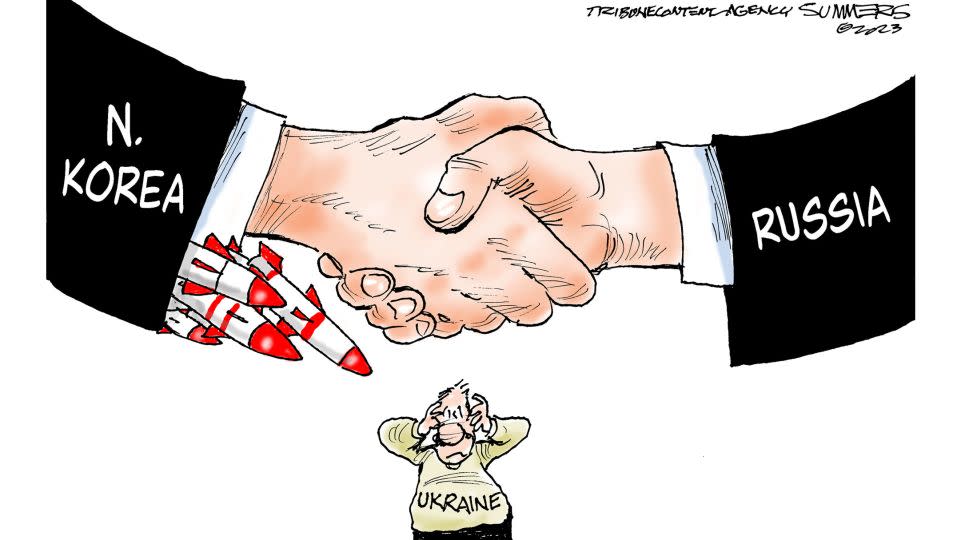
AI
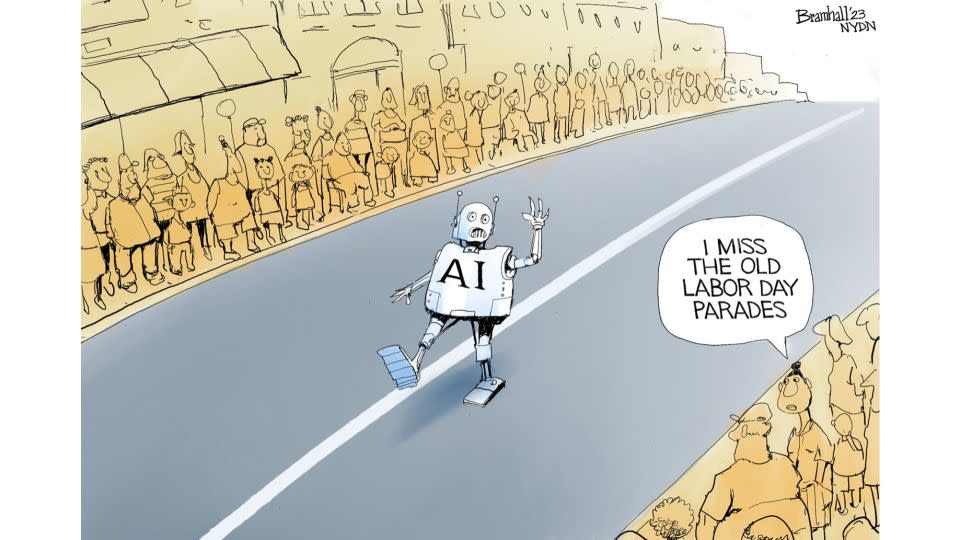
“AI is coming for your job.”
As Bethany Cianciolo and Jessica Chia wrote in CNN Opinion’s ongoing series on artificial intelligence, “That’s just one variation of the many headlines you’ve probably seen ever since ChatGPT exploded in popularity and won the world’s attention late last year. But is it true?”
AI could do the work performed by as many as a quarter of all workers, according to Goldman Sachs economists. “In some industries, experts have suggested a future in which AI can assist humans rather than replace them entirely. In others, artificial intelligence may have little to no impact at all.” They curated the views of experts in medicine, law, art, retail, film, tech, education and agriculture. Read their thoughts here.
Burning (Muddy) Man
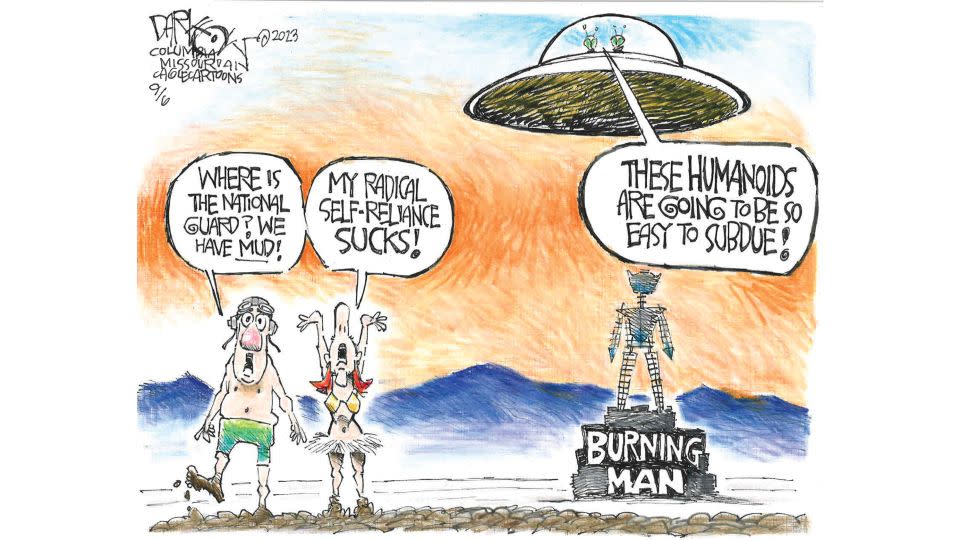
The Burning Man festival held each summer in the Nevada desert celebrates the idea of “radical self-reliance,” wrote Jill Filipovic. “That principle was certainly tested this year, as torrential rains stranded thousands of Burners on the playa for several days.” Some escaped with long treks through the mud while others hunkered down until the sun returned.
“Burning Man is no doubt a lot of fun — some of my best friends, as the saying sort-of goes, are Burners — but even many long-time attendees have noted the event’s shift from counterculture mecca to a see-and-be-seen desert drug party for influencers and Silicon Valley sorts,” Filipovic noted.
“So much about Burning Man reads as rank hypocrisy, from an ethos of ‘decommodification’ that somehow accommodates billionaires flying in on private jets to a principle of ‘leaving no trace’ that pledges to ‘leave places in a better state than when we found them,’ and yet is inevitably followed by leaving places from California to Utah totally trashed.”
Yet, be careful about the schadenfreude: “The unpredictable mayhem of climate change means that in the future, the wet, hungry, scared and stranded could be any of us.”
The divorce

When musician Joe Jonas filed for divorce from actor Sophie Turner, “gossip sites like TMZ and Page Six framed their ‘different lifestyles’ — Turner as a party girl and Jonas as a ‘homebody’ trying to look out for his daughters,” wrote Patricia Grisafi.
“Why does any of this matter? In many ways, celebrities help us identify and define our experiences and clarify our own anxieties,” Grisafi observed. “We look to see how the world reacts to their lives. And in this particular instance, we’re looking to see how our culture treats women who are implied or judged to be ‘bad mothers.’”
“These voices are joining what appears to be a growing chorus of pushback against the tired tropes of the past.”
NFL

Coy Wire played in the NFL for nine years. “I was knocked unconscious several times,” he wrote in a piece for CNN Opinion ahead of Sunday night’s airing of “Hard Hits: Can Football Be Safe?” on The Whole Story with Anderson Cooper. “One time, I didn’t remember what happened until I saw it on film the next day. I came away with a titanium plate and four screws in my neck.”
He still feels the effects of his football career. “On many days, I wake up feeling like I’ve been through a car crash … even though it’s been more than a dozen years since my last snap in the league. Every time I lose my keys, I wonder, ‘Did I get hit one too many times?’ I pray that I’ll still be able to run and play with my wife and our two young daughters for many years to come, and remember those days forever.”
“Even given all that, I would also never trade the time that I spent on the gridiron. For me, the rewards have far outweighed the risks, and in some ways, I’ve beaten the odds. … Football isn’t safe, but it’s safer, now that we are having many more, and deeper, conversations about the future of America’s most popular sport.”
Covid bump
First lady Jill Biden is one of many Americans affected by the resurgence of Covid-19. She suffered mild symptoms and by the end of the week was testing negative, according to the White House.
Others have had more serious cases. Hospitalization rates have increased, Dr. Kent Sepkowitz wrote. “Most ominously, weekly deaths are just now beginning to rise, though overall numbers remain low compared with the 2022 experience.”
“There are several plausible reasons why this latest bump is occurring now after months and months of calm. Most attention is focusing on the latest variant, labeled BA.2.86, which is quickly replacing the strain that predominated for most of 2023, XBB.1.5. With each new variant, the protection from previous infection and previous vaccination slips away a bit more, leaving the US and the world more susceptible. Right now, BA.2.86 (or XBB.1.5 before it) does not appear to cause more severe disease, and antiviral treatments such as Paxlovid remain effective.”
For more:
Rose Rubin Rivera: With Covid on the rise again, I can’t afford to let my guard down
Diane O’Leary: Here’s why #MedicalGaslighting has taken social media by storm
Domestic extremists
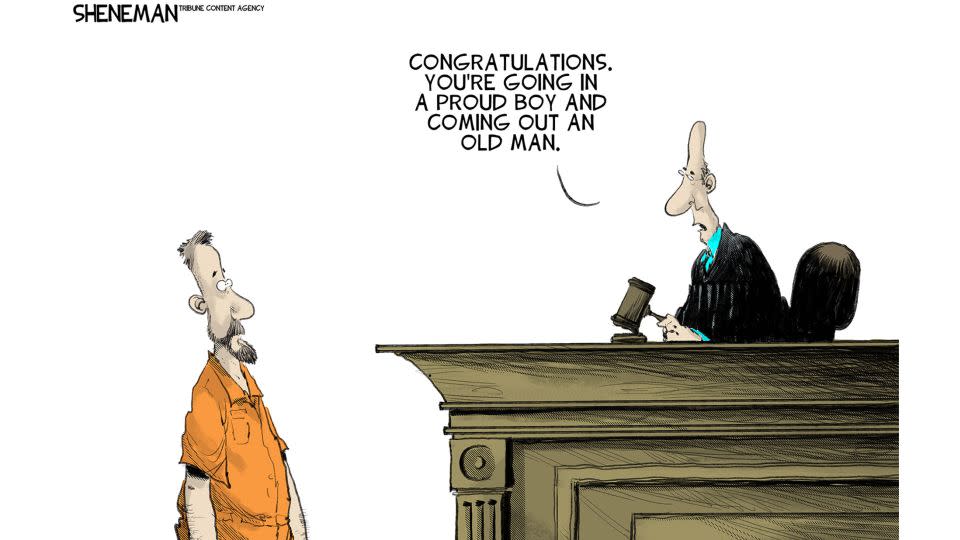
A federal judge sentenced senior members of the Proud Boys to long prison sentences, holding them accountable for serving “as the tip of the spear on the January 6, 2021, attack on the US Capitol,” wrote Jon Lewis, who studies domestic extremism and praised the sentences as “a victory for democracy and the rule of law.”
“However, as we creep closer to another presidential election, it is difficult to argue that the domestic terrorism threat is any less significant — or that the federal government is any better positioned to respond to it — than it was” before the Capitol riot, Lewis observed.
“The massive intelligence failures that led to the attack on the Capitol are a worrying microcosm of a long-stagnant government response to an increasingly decentralized, online and mainstreamed domestic terrorism threat. The inability to recognize the warning signs of an insurrection planned in plain sight should have led to a sea change in the federal approach to countering domestic terrorism.”
Don’t miss
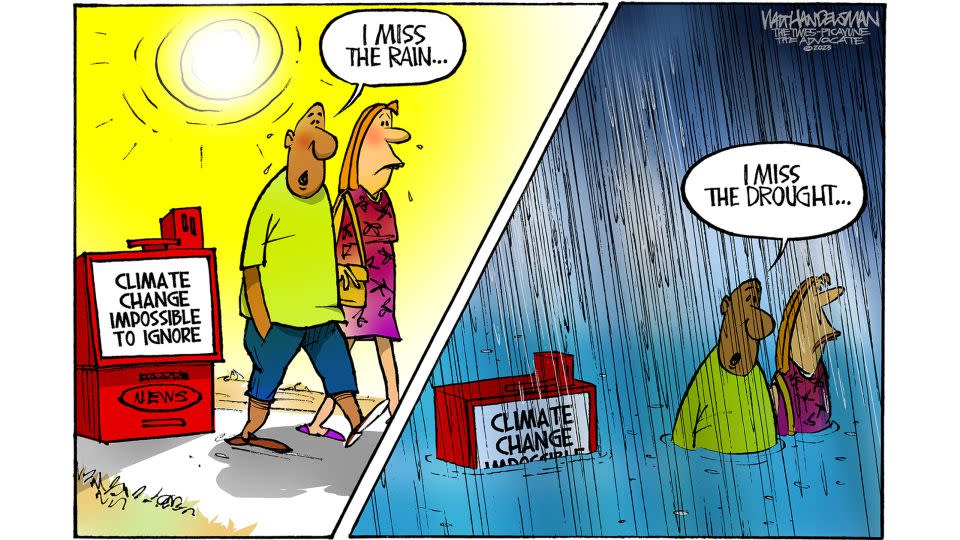
Jane Horton: Why the fall of Afghanistan broke me in a way my husband’s death didn’t
Jeff Yang: I’ve loved musicals my whole life. This one changed how I see them
Kara Alaimo: Those perfectly coiffed kids you’re seeing on social media signal that we have a problem
Onnie Willis Rogers: The reason Simone Biles can shine
Steve Lubet: Why Trump won’t be able to talk his way out of it for once in his life
Sara Stewart: Why I’m hoping ‘motherhood spectrum’ will be the new ‘sober curious’
Jeff Vasishta: Why Vivek Ramaswamy’s swipe at Nikki Haley was so off base
Nolan Peterson: Remembering ‘Juice,’ the young fighter pilot who embodied the Holy Grail of aviation
Roy Cooper: Our state is on the front lines of voting rights battle
Anne Byrn: With the arrival of fall, a much-neglected meal is back on the menu
AND…
Jimmy Buffett
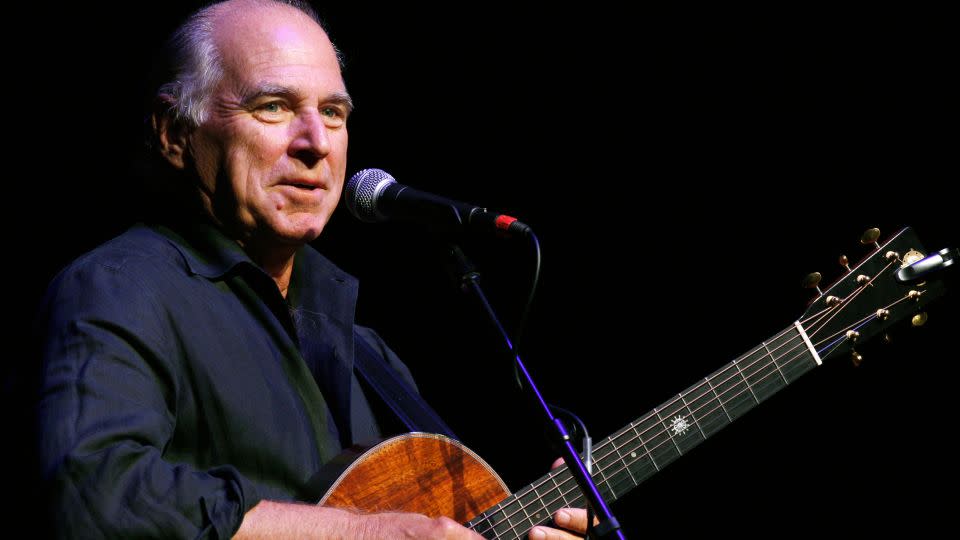
Jimmy Buffett, who died September 1, had only one Top 10 hit on the Billboard Hot 100, but it proved to be a momentous one.
“Margaritaville” was much more than just a song. As Ryan White wrote, “Nearly 50 years later, you can find Margaritaville cafes and airport bars. There are hotels, resorts, cruise ships and retirement communities. There are Margaritaville T-shirts, blenders, flip-flops, frozen foods and protein shakes. (No, those don’t make a ton of sense given the character in the song ‘Margaritaville’ is falling-down drunk and decidedly not interested in healthy options.)”
“All of that happened because of Parrot Heads, those most dedicated of Buffett’s fans. They simply refused to let him fade into the state fair and oldies circuit, and he refused to let them down. If they wanted to hear ‘Cheeseburger in Paradise,’ he’d play it. He played it every night as they carried on in those T-shirts and shoes while planning vacations, if only in their mind. It was all easier back then.”
“Plenty of people over the years have accused Buffett of being a master of bland, suburban kitsch that appealed to middle managers yearning to be burnouts…”
“Instead, what you find when you meet Parrot Heads is a lot of people who have busy and complicated lives and just want to have a little fun. They want to see their friends at the show, year after year. Buffett became one of those friends, and he was also a fantastic example of work-life balance in a country that tends to only celebrate the grind.
For more CNN news and newsletters create an account at CNN.com

